France's centuries-old mountain farm stays
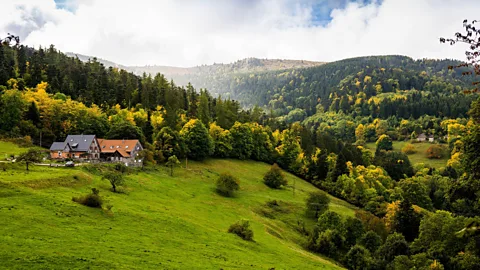 Alamy
AlamyReachable via ancient mule trails, these centuries-old farms-turned-inns serve some of France's most historic cheeses and offer a glimpse at the nation's pastoral past.
I'd been hiking for five hours and a fine, freezing rain had just begun to fall. Some years, I've been told, May in eastern France's Vosges mountains can be almost aestival; others, it's stormy and frigid. Distant cow bells interrupted the near-silence, and I unfolded my waterlogged map, peering at a small dot that was rendered real as I climbed a hill and finally glimpsed a long stone building whose red roof stood out against the rolling green hills, its windows glowing with promised warmth. I had reached Rothenbrunnen, a ferme-auberge (farm-inn) typical of these verdant pastures, and my home for the night.
While European farm stays have become increasingly popular in the past few decades, the mountaintop fermes-auberges here in the Alsace region near the German border stand out: not only are they some of France's oldest, dating to the 1800s, but they are linked by a series of well-marked trails leading hikers like me directly to their doorsteps. After a day of trekking along the grassy slopes and taking in breathtaking bucolic views of dark pine forests and red-roofed houses in the valleys below, these rustic inns provide travellers with a traditional repas marcaire (dairy farmer's meal) featuring farm-made charcuterie and cheese – and, if they wish, a bed for the night.
The presence of marcaires (dairy farmers) in these mountains dates to at least the 9th Century, when they began leading their cattle from the Munster Valley onto the 1,200m-high plateaus each spring to take advantage of rich pastures to produce local cheeses, including the washed-rind Munster that shares the valley's name. In the late 19th Century, these farmers also became innkeepers, thanks in large part to the 1872 creation of the Club Vosgien, a trekking organisation that transformed local mule tracks into well-maintained hiking trails, which they still mark and maintain today. In so doing, the club created a destination for hikers, who soon came knocking at the marcaires' doors.
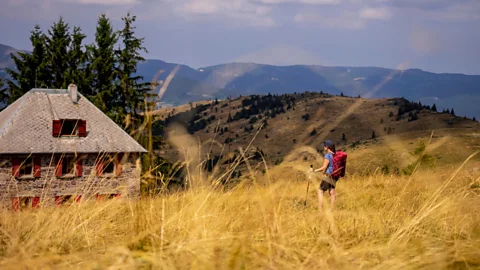 Alamy
Alamy"The marcaires, at the time, started to develop the habit of serving a bit of bacon or a few potatoes to passing hikers," explained Sabine Naegel, who works for Alsace Destination Tourisme. "That's kind of how it came to be."
The Association des Fermes-Auberges du Haut-Rhin, which was created in 1971 by local farmers, formalised the arrangement. Today, 41 member farmer-innkeepers espouse shared values of conviviality, simplicity and generosity. Their charter outlines environmental and touristic standards, as well as an essential trait: members must be farmers, first and foremost.
"You can't be an inn and then raise two or three cows," explained Naegel. "It's the opposite: you're a farmer, and then you showcase your products on the farm."
Rothenbrunnen ticks all these boxes: a dairy farm run by the same family since 1970 producing local cheeses, with seven private bedrooms and a 15-bed dormitory ready to welcome hikers, cross-country skiers and even e-bikers. The inn also stands out from its neighbours as one of the few fermes-auberges that remains open all year long.
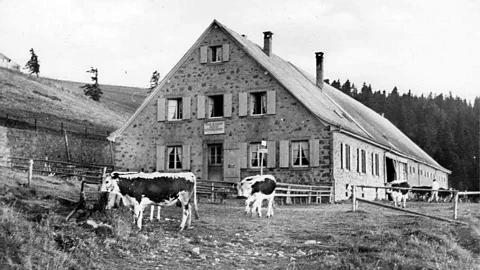 Rothenbrunnen
Rothenbrunnen"We were born into it," said Valérie Schwebel, who took over the farm from her parents with her sister Christelle Fest, Christelle's husband Frédéric and their son Kévin in 2016. "We never knew anything else."
A barn was at one end of the long, stone building and the rustic dining room was at the other, decorated with massive cow bells and pastoral photographs. My cosy, wood-panelled bedroom was upstairs, equipped with simple twin beds, an armoire and a private bathroom, where I sloughed off my wet clothes and relaxed my weary muscles with a hot shower.
I'd reached Rothenbrunnen as many long have: on foot, hiking 7km from the town of Metzeral, which is reachable by train from Paris. From Metzeral train station, the Club Vosgien's well-marked routes afford easy access to the Petit Ballon, one of the Vosges' highest peaks. Compared to the highest, Le Hohneck, which I hiked the previous day, the Petit Ballon, overlooking the houses of Munster and Sondernach and boasting lots of picnic spots along the way, is accessible even for a novice, though it's also possible to book a guide through the local tourism office.
An overnight stay at a ferme-auberge includes both breakfast and dinner, and at Rothenbrunnen both are prepared by Frédéric, a retired truck driver who took over the kitchen several years ago. In keeping with the official charter, 55% of the food at Rothenbrunnen is made using the family's farm products. My set menu began with charcuterie, including sausage made with Rothenbrunnen's own beef. Next was a hearty portion of homemade pork pie, raw vegetable salads and roïgabrageldi, a local dish of potatoes slowly cooked in farm butter. Each bite of dessert – a wild blueberry tart – reminded me of the brimbelle (wild blueberry) bushes I had traipsed past on my way here, glimpses of baby chamois in the distance.
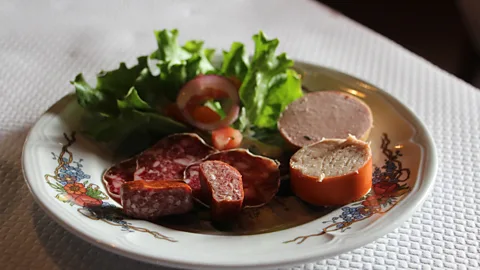 Emily Monaco
Emily MonacoBelly full, I slipped outside, where Kévin had decided the weather was mild enough for their 60-cow herd to spend their first night of the season under the stars. I later watched them twinkling from the comfort of my bed, the skylight magnifying the percussive pitter-patter of rainfall as I drifted off to sleep.
Breakfast featured farm butter, jam and the farm's core bounty: cheese. Springy tommes riddled with small holes were far more approachable first thing in the morning than the pungent soft cheese the region is known for, even though I have a particular weakness for Munster's brothy, umami-rich flavour. At Rothenbrunnen, the cheeses are made each day by the Fests' 21-year-old daughter, Marie, and after breakfast, she invited me to join her in the dairy as she produced her washed-rind delicacy, scooping rich, compact curds into perforated moulds. She'll need to wait for the richer summer milk to produce the family's larger tommes: traditional Barikass and the slightly springier Le Randonneur (the hiker), Marie's personal favourite.
More like this:
• The Cornish farm that plans to last 1,000 years
"You add spices and things like that," she said, noting she has experimented with adding ingredients like spring garlic and sundried tomato to the mild-mannered Le Randonneur. "So it's a bit more fun." When the cheeses have drained, they'll be moved downstairs to the ageing cellar, where Marie's father, Frédéric, takes up the reins. Here, he carefully washes each soft cheese with brine to help it develop a sticky, rusty rind – a signature of the region's Munster.
But despite adhering to the recipe, the family's cheese cannot legally bear the name of their valley: Munster is protected by PDO, the label that governs the origins of such traditional products as Champagne and Parmigiano-Reggiano. In accordance with its charter, Munster can only be produced in seven departments in the Vosges mountains with the milk of Vosgienne, Simmental, Prim'Holstein or Montbéliarde cows – though farmers prefer the black-and-white Vosgienne cattle breed, named for these mountains, to highlight the local terroir.
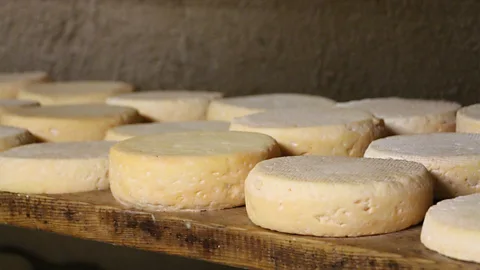 Emily Monaco
Emily MonacoAt Rothenbrunnen, however, the copper cows happily grazing in the sunshine were Tarentaises, a Savoyard breed Valérie and Christelle's grandfather adopted on his valley farm in Breitenbach in 1960, after he lost his entire herd to Brucellosis [bacterial disease] and "fell in love", as Christelle said, with seven russet calves from Savoie.
There's nothing in the ferme-auberge charter that specifies which types of cattle farmers can rear. In fact, a fermier-aubergiste can raise anything from Tarentaises to trout, as one did until he recently retired. But the PDO board is not so open-minded, and two years ago, it forbade the Fests from using the word "Munster" on their packaging.
"My grandfather had awards [for his Munster]," said Christelle. "They shouldn't judge the breed of the cows. It's about where they graze."
"It's a shame to have got to this point," added Frédéric.
Still, the family has no intentions of changing their cheese production – just their label, which now reads "M1ster" instead of "Munster." It's richly brothy, with a flavour reminiscent of fried eggs. Unlike many Munsters, which make their presence known the second they're unwrapped, M1ster is saltier than it is stinky, with an almost feta-like crumbliness and a compact-enough texture to make the perfect sandwich for a hike.
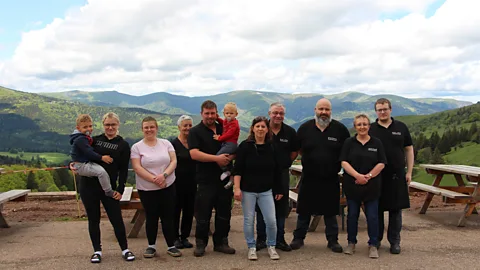 Emily Monaco
Emily MonacoCheese-labelling aside, the family has made other changes to their farm stay, as more urban travellers have recently started venturing to the mountainous region. In addition to the traditional repas marcaire, Frédéric's new à la carte menu now features farmstead cheeseburgers and even vegetarian omelettes, though vegans have little choice unless, as Christelle quipped, "They go graze with the cows." Indeed, the ferme-auberge charter's stipulation of showcasing farm products would make it difficult to provide much by way of fresh produce, which is hard to grow at this altitude. "We tried," said Frédéric. "The temperatures just don't allow it."
But because of the effects of climate change, that may not be the case for long. Rothenbrunnen has long stood out from other fermes-auberges in welcoming winter travellers who come to take advantage of cross-country skiing, snowshoeing or even dog-sledding through the mountains. But unlike his great-grandfather, who waited until the snow thawed in May to drive the herd up the mountain from Breitenbach, warming temperatures mean that Kévin now keeps the cows at altitude all year. "Winters aren't as bad as all that anymore," he explained.
The resulting lack of snow has also led to other changes, such as water usage. Signs around the inn request that guests be mindful of water consumption, and pressure reducers in the showers and toilets provide help in this endeavour.
As the world changes around it, Rothenbrunnen carries on, and even on this dreary May day, the inn was packed. As for the future, Kévin and Marie are clearly up to the challenge, taking up the tradition with passion and pride.
"They were born into it," said Christelle. "They were always with me."
Here, at this family-run inn, tradition is alive and well. And for a hiker with good shoes – and a good raincoat – it's easy to see that first-hand.
Slowcomotion is a BBC Travel series that celebrates slow, self-propelled travel and invites readers to get outside and reconnect with the world in a safe and sustainable way.
--
If you liked this story, sign up for The Essential List newsletter – a handpicked selection of features, videos and can't-miss news, delivered to your inbox twice a week.
